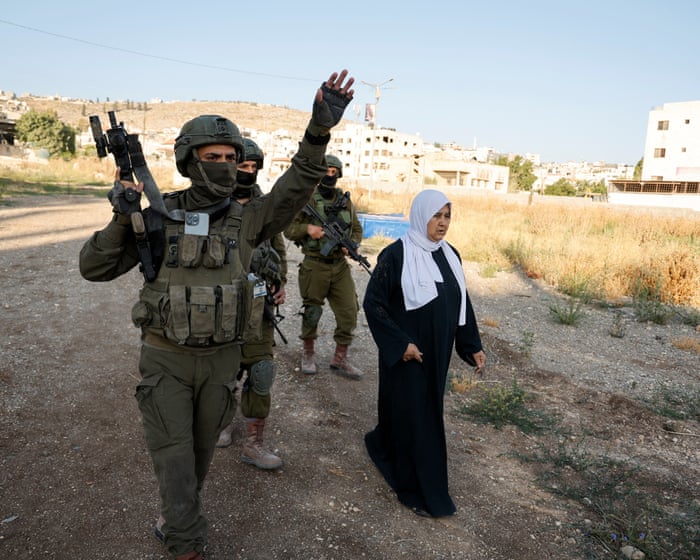Shadi Dabaya’s body tells the story of life under Israeli occupation. The 54-year-old proudly jutted out his jaw to reveal where part of his cheek had been torn away by gunfire, then pointed to the zigzag scar on his arm—raised pink flesh tracing the path a bullet took through his body.
“I got these during the second intifada,” Dabaya said with a smile. He pulled up a video on his phone showing him, just a year before, confronting an Israeli armored vehicle in Jenin camp armed with nothing but a sandal.
As he spoke, an Israeli military truck drove past. This time, he only watched it go by, not daring to approach.
Israeli soldiers have occupied Jenin camp since January, forcing out all 14,000 residents and building earthen barriers to isolate the area from the rest of the city. While the military operation—called “Iron Wall”—has succeeded in dismantling Palestinian militant groups there, the soldiers have stayed.
Jenin was once known as Palestine’s “martyrs’ capital.” The Jenin battalion, a unique alliance of fighters from different Palestinian factions, fiercely resisted Israeli incursions. It was often said that Jenin and Gaza were the two places Israel could never fully control.
Now Gaza lies in ruins, and the martyrs’ capital has fallen silent. Israeli soldiers patrol Jenin’s streets freely and carry out near-daily raids. The resistance fighters who gave the city its reputation are now only a memory—their faces fading on posters hung along sun-scorched streets.
“We are tired,” Dabaya said. “Resistance seemed like a good idea, but look what happened to Gaza. All the fighters are gone, and now we just want to live in peace.” He has stopped trying to check on his home in Jenin camp after soldiers caught and severely beat him last month.
To people across the West Bank, the war in Gaza served as a warning. Watching bombs destroy 88% of the Gaza Strip over the past two years, they realized there was no limit to what Israel would do to crush Palestinian militants.
Now, as the war in Gaza winds down, Palestinians fear Israel will turn its focus to the West Bank.
Eager to avoid suffering the same fate as Gaza, voices of resistance have fallen silent—even as daily settler attacks and restrictions sharply increase. A recent preliminary approval in the Knesset to apply Israeli law to the occupied West Bank—a move paused after figures from the Trump administration voiced strong disapproval—hardly caused a stir among Palestinians. Just two years ago, it would have sparked mass protests.
In Jenin, the reach of the military occupation is slowly expanding. Soldiers visit residents living near the camp every day, and bulldozers tear up their roads.
“When we used to hear shooting, we thought there was a fight in the camp. Now we know it was the Israelis—not a single bullet comes from the Palestinians. There’s no one left,” said Hiba Jarar as she cleaned her house after Israeli soldiers searched it a few days earlier.
Jarar lives in Jabria, an affluent neighborhood overlooking Jenin camp. From her living room window, she can see troops moving back and forth from their makeshift barracks—a repurposed apartment building.
She is one of the last residents in the area. One by one, neighbors have been raided by the military and told to leave. A row of luxury villas now stands empty, the road leading to them ending at a high mound of dirt piled up by Israeli bulldozers.
“The Israelis know they have nothing to fear anymore,” Jarar said. “They raid houses freely.””Now there’s only one soldier left. The soldier who searched my house was respectful, so I was fortunate. But who knows what will happen next time,” said Jarar.
With resistance suppressed, daily humiliations have grown worse. Videos frequently appear on social media showing soldiers rounding up groups of young men, forcing them to march with their heads down and hands behind their backs in mass arrests.
Mustafa Sheta, the general manager of Jenin camp’s Freedom Theatre arts centre, was arrested at his home in December 2023 by Israeli soldiers, along with hundreds of other Palestinians. He spent 15 months in administrative detention without being charged—a common Israeli practice that allows indefinite imprisonment without trial.
He described prison guards filming him and other inmates with their phones during strip searches, and guards making detainees lie on their stomachs while using their backs as springboards, jumping back and forth over their bodies.
When Sheta was released in March, he found Jenin camp occupied and the spirit of its residents broken.
“I was shocked because Jenin is the capital of resistance. Where are the fighters? What’s happened to them? It felt like we lost the war, like we’re losing this battle,” Sheta said.
“People’s priorities have changed. At first, we talked about revolution, the right of return, political issues. But now they talk about something else—they ask what they can do in this new kind of life.”
Questions of resistance have faded along with the fighters who once claimed to have answers. Now residents are more focused on the daily struggle to survive, as poverty and Israeli restrictions make life increasingly difficult.
Even though the fighters’ guns have fallen silent, some in Jenin continue to push for quieter forms of defiance to assert their existence.
“They don’t treat us even as animals—they consider us nothing. So we need to reopen that important discussion about how we can be resilient and stay in our homeland,” Sheta said.
[4:35 – Could the West Bank become the next Gaza? – video explainer]
Frequently Asked Questions
Of course Here is a list of FAQs about the fading resistance in the West Bank amid fears of a Gazalike Israeli operation with clear and concise answers
General BeginnerLevel Questions
1 What is the main topic of this FAQ
This FAQ is about why organized resistance in the West Bank seems to be decreasing largely due to peoples fear that Israel might launch a major military operation there similar to the one in Gaza
2 What is the West Bank
The West Bank is a landlocked territory on the west bank of the Jordan River It is home to nearly three million Palestinians and is a central part of the IsraeliPalestinian conflict
3 What is meant by resistance in this context
Resistance refers to organized Palestinian actions against Israeli control This can range from peaceful protests and political activism to armed actions by militant groups
4 Why are people in the West Bank afraid of becoming the next Gaza
They fear a largescale Israeli military invasion involving intense aerial bombing ground troops and widespread destruction similar to what happened in Gaza leading to massive casualties and a humanitarian crisis
5 How has the resistance faded
There are fewer largescale organized confrontations or militant operations Public displays of resistance have become less frequent as people prioritize survival and fear the severe consequences of provoking a major Israeli response
Deeper Advanced Questions
6 What are the main factors causing this decline in resistance
The primary factors are
Deterrence The devastating impact of the war in Gaza serves as a powerful warning
Increased Israeli Military Presence There are more checkpoints raids and arrests making it harder for resistance groups to operate
Political Fragmentation The Palestinian Authority which governs parts of the West Bank often cooperates with Israel on security further limiting resistance activities
Public Exhaustion Many people are focused on daily survival amid a struggling economy and are wary of more violence
7 Isnt the goal of resistance to challenge occupation Why would it fade
Yes that is the goal However when the perceived cost of resistance becomes overwhelmingly highsuch as the threat of total devastationthe instinct for immediate community preservation can temporarily override longterm political goals



